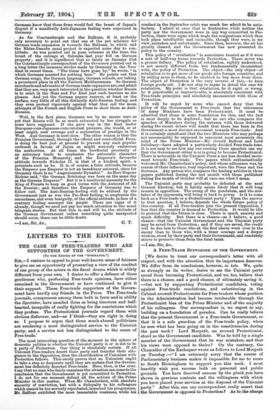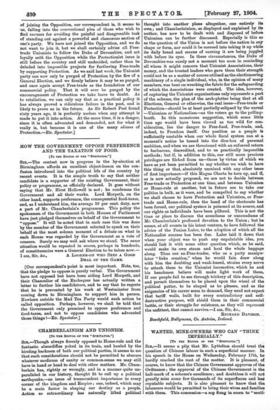• LETTERS TO THE EDITOR.
THE CASE OF FREE-TRADERS WHO ARE SUPPORTERS OF THE GOVERNMENT.
[TO THE EDITOR OF THE "sew-rev:nil
venture to appeal to your well-known sense of fairness to give me an opportunity of presenting a view of the condnct of one group of the actors in the fiscal drama which is widely different from your own. I desire to offer a defence of those gentlemen who, professing Free-trade opinions, have either remained in the Government or have continued to give it their support. These Free-trade supporters of the Govern- ment have hardly any friends in the Press. The Free-trade journals, conspicuous among them both in force and in ability
the Spectator, have assailed them as being timorous and half- hearted, incapable of really fighting for the convictions which they profess. The Protectionist journals regard them with obvious disfavour, and—as r think—they are right in doing BO. I propose to argue that these much-abused politicians are rendering a most distinguished service to the Unionist party, and a service not less distinguished to the cause of Free-trade.'
The most interesting question of the moment in the sphere of domestic politics is whether the Unionist party is or is not to be a party of Protection. One thing is absolutely certain. If all Unionist Free-traders desert their party and transfer their alle- giance to the Opposition, then the identification of Unionism with Protection follows. This surely proves that no Unionists ought to take a step so desperate until they are certain that the Govern- ment has definitely deserted Free-trade. Here, then, is the crux. I say that no man who fairly examines the situation can come to the conclusion that the Government is yet committed to Protection. I do not for one moment defend all the actions of the Prime Minister in this matter. When Mr. Chamberlain, with absolute sincerity of conviction, but with a disloyalty to his colleagues which cannot be too severely reprobated, launched his programme, Air. Balfour exhibited the most lamentable weakness, while his conduct in the September crisis was much too adroit to be satis- factory. I admit at once that in September, while neither the party nor the Government were in any way committed to Pro-. tection, there were signs which made the resignations which then took place intelligible and excusable, though they were, in my view, mistaken and unfortunate. Since then, however, the air has greatly, cleared, and the Government has now presented its policy to the country.
This policy of "retaliation" is sometimes treated as if, it were a sort of half-way house towards Protection. There never was a grosser fallacy. The policy of retaliation, rightly understood, is not merely different from, but fundamentally inconsistent with, the policy of Protection. The object—the only object—of retaliation is to get more of our goods into foreign countries, and by selling more to them, to be enabled to buy more from them. The object of Protection is the very reverse of this,—to keep foreign goods out. I slo not stop to argue in detail the case for retaliation. My point is that retaliation, be it right or wrong, be it practicable or impracticable, is absolutely consistent with Free-trade principles and absolutely inconsistent with those of Protection.
It will be urged by some who cannot deny that the policy of the Government is Free-trade that the utterances of many Ministers have been Protectionist. It must be admitted that there is some foundation for this, and the fact is most deeply. to be deplored ; but no one who compares the speeches of Ministers during the autumn with those delivered during the recent debate will doubt that there has been in the Government a most distinct movement towards Free-trade. And
it s certainly significant that the two Ministers who may perhaps not unreasonably be supposed to represent most accurately the mod of the Prime Minister—Mr. Gerald Balfour and Lord Salisbury—have adopted a particularly decided Free-trade tone. It is not easy to see how any one reading those speeches can say that the Government either is or is going to become Protectionist.
There s noticeable in the Unionist Press a not less decided move- ment towards Free-trade. Two papers which enthusiastically welcomed Mr: Chamberlain's policy, and whose adherence was, by reason of their influence, very important, were the Times and the Scotsman. Any person who compares the leading articles in those papers published during the last month with those published during the month of October will at once see what I mean.
The Unionist party may probably be defeated at the next General Election, but it hardly seems likely that it will long remain in opposition. The swing of the pendulum, and the mis- takes of its opponents, will bring it back to power. Is it to come back as a Free-trade or a Protectionist party ? Upon the answer to that question, I believe, depends the whole future policy of this country. If all Free-traders join the present Opposition, I fear that the country is doomed to Protection. It would be idle to pretend that the future is clear. There is much anxiety and much difficulty. But there is a chance—as I believe, a good chance—that the Unionist Government and the Unionist party may be saved from Protection ; and if they are saved, the credit will be due less to those who at the first alarm went over to the enemy than to those who, with a truer courage and a deeper wisdom, stood by their party and their Government, and resolutely strove to preserve them from the fatal taint.
—I am, Sir, &c.,
A FREE-TRADE SUPPORTER OF THE GOVERNMENT.
[We desire to treat our correspondent's letter with all respect, and with the attention that its importance deserves. We differ from its conclusions, however, in toto. We, quite as strongly as its writer, desire to see the Unionist party saved from becoming Protectionist, and we, too, believe that
there is a chance, and a good chance, of ultimately saving it, —but not by supporting Protectionist candidates, voting against Free-trade resolutions, and substituting in the
Cabinet avowed Protectionists for Free-traders whose position in the Administration had become intolerable through the Protectionist bias of the Prime Minister and of the majority of his colleagues. Our correspondent is, we regret to say, building on a foundation of paradox. Can he really believe that the present Government is a Free-trade Government, or that it is a safe guardian of the Free-trade policy, when he sees what has been going on in the constituencies during the past week ? Lord Morpeth, an avowed Protectionist, stood as the Government candidate. Was he told by a single member of the Government that he was mistaken, and that his views were opposed to theirs ? On 'the contrary, the Chancellor of the Exchequer wrote as follows to Lord Morpeth on Tuesday :—" I am extremely sorry that the course of Parliamentary business makes it impossible for me to come to South Birmingham to support you this week. I most heartily wish you success both on personal and public grounds. You have deserved success by the pluck you have shown in previous contests and the willingness with which you have placed your services at the disposal of the Unionist party." After this, can our correspondent really assert that the Government is opposed to Protection? As to the charge
of joining the Opposition, our correspondent is, it seems to us, falling into the conventional plea of those who wish to find excuses for avoiding the painful and disagreeable task of standing out against a powerful and clamorous section of one's party. We have not joined the Opposition, and we do not want to join it, but we shall certainly advise all Free- trade Unionists to follow the Duke of Devonshire, and act loyally with the Opposition while the Protectionist issue is still before the country and still undecided, rather than be deluded into impossible projects for furthering Free-trade by supporting Protection. As we said last week, the Unionist party can now only be purged of Protection by the fire of a General Election, and we firmly believe it may be so purged, and once again accept Free-trade as the foundation of our commercial policy. That it will ever be purged by the encouragement of Protection we take leave to doubt. As to retaliation, we can only say that as a practical policy it has always proved a ridiculous failure in the past, and is likely to prove so in the future. As Sir Robert Peel found sixty years ago, it is perfectly useless when any attempt is made to put it into action. At the same time, it is a danger, since it is often advocated and demanded, not for what it really is, but because it is one of the many aliases of Protection.—En. Spectator.]











































 Previous page
Previous page